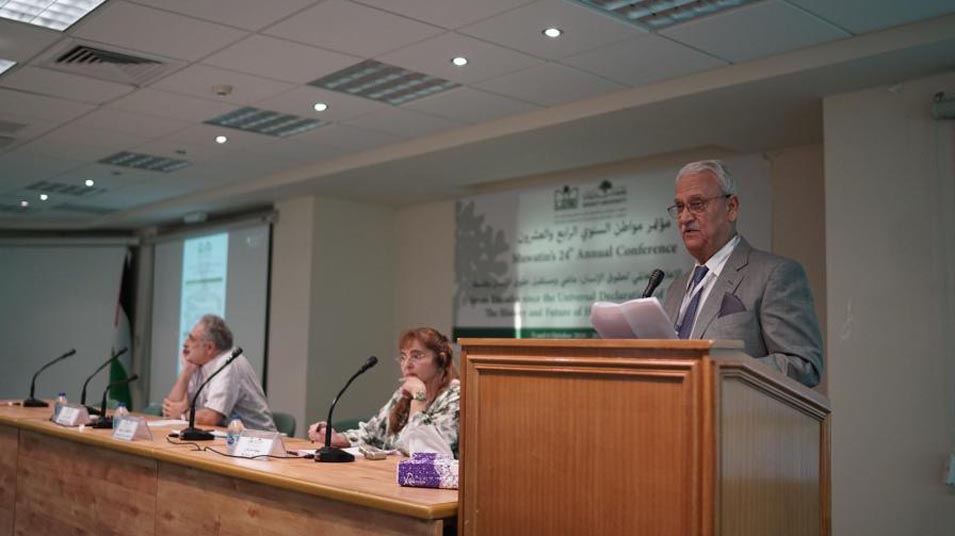Annual Muwatin Conference reviews seven decades of the Universal Human Rights Declaration
Seven decades since the issuance of the Universal Declaration of Human Rights, the Muwatin Institute for Democracy and Human Rights at Birzeit University critically assesses the progress of its implementation in its 24th annual conference.
In the two-day conference "Seven Decades of the Universal Declaration of Human Rights: the History and Future of Human Rights and Palestine," local and international academics, researchers, and human rights experts will bring attention to issues related to the concepts of human rights, its transformations, its applications, and its role and place within the Palestinian liberation process and the international context.
Birzeit University President Abdullatif Abuhijleh affirmed, in his opening speech, the university's commitment to holding the Muwatin conference annually, a tradition that has continued year after year for 24 years. "The issues that are tackled by Muwatin's annual conferences are highly important to contribute in facing the complex problems that Palestine and the world, in order to attain our liberation and independence."
Director of the Muwatin Institute for Democracy and Human Rights Mudar Kassis talked critically about the concept of human rights, noting that conceptions of human rights have sustained particular forms of power, and some states can only attain their rights through power or means of international relations such as diplomacy, negotiations, and humanitarian and economic aid.
Kassis described human rights as a "myth," focusing on two narratives that have to be taken into account when talking about human rights. The first critically assesses those who wrote the Declaration of Human Rights and their real intentions. The second is the narrative that we know about Palestine, and how the declaration and other documents have played a major role in recognizing the Palestinians’ right to self-determination, and called upon all other countries, especially Arabs, to stand in solidarity with the Palestinian people.
In her speech, the Director of Henrich Boll Stiftung in Palestine and Jordan, Bettina Marks, highlighted the status of human rights in European foreign policy, questioning whether values or national interests are the main drivers of this policy.
During the two-day conference, 18 papers were presented by international and local professors, and a special roundtable discussion on “Human Rights in the Context of National Liberation,” took place on the second day.
The first day of the conference included two sessions. The first was entitled "The Nature of Human Rights" and was chaired by professor of gender studies Islah Jad. Professors Raef Zreik, Raja Bahlul, an, Asem Khalil were the key speakers in the session and talked about the dark side of human rights, the universalism of human rights, and human rights in Palestine and internationally within the changing world.
In the second session, chaired by professor Amirah Silmi and entitled "Human Rights in the Political Field," academics and experts including Reem Bahdi, Jason Beckett, Samera Esmeir, and Said Zeedani tackled the dimensions of dignity in the declaration of human rights, gave reflections on the fate of the project of human rights, and tried to determine foes and allies in the battle to protect human rights.
The second day of the conference included two sessions and a roundtable discussion. The first session, entitled “Are Human Rights Ordained with Binaries?,” was chaired by faculty member and former director of the Institute of Law at Birzeit University. The session comprised presentations and interventions by Marina Rosa, Sanaa Al-Sarghali, Ralf Wilde, and Reem Al-Botmeh, who explored the nature and limits, and the points of intersection, of various laws and regulations, and whether they can be used as tools of emancipation or persecution.
The second session of the day, entitled “Third World Approaches to Human Rights in Palestine,” was chaired by Hala Shuaibi, chair of the Department of Law at Birzeit University. John Reynolds, Sujith Xavier, and Usha Natarajan explored the application of the Universal Declaration of Human Rights within contexts of settler colonialism and addresses the merits and demerits of legal proceedings based on that declaration.
A discussion, entitled “Round Table Discussion on Human Rights in the Context of National Liberation,” followed the final session. The discussion, chaired by Professor of Philosophy and Cultural Studies at Birzeit University George Giacaman, included authorities on the subject matter such as Fateh Azzam, Ammar Dwaik, Sahar Francis, and Shawan Jabarin, who explored alternative human rights social and political movements; the role of international law in Palestinian liberation; the laws and procedures applied in Israeli prisons and the role of legal defenses in national liberation; and socio-economic rights within the human rights apparatus in the context of liberation.







